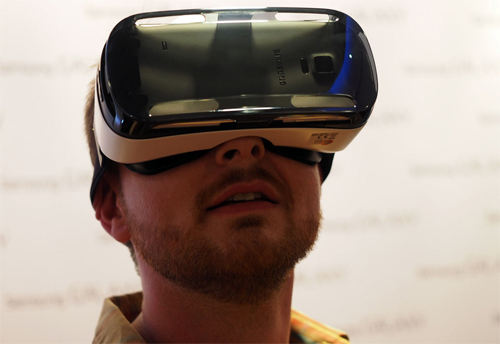While many of us have heard of virtual reality (VR), we are likely less familiar with its applications. While VR can be an immersive gaming experience, it can also be used to confront your biggest psychological fears. In fact, some psychologists currently use this technology as treatment for patients with psychotic disorders and paranoid ideations. People with paranoid ideations believe they are being harassed and are suspicious of other people’s motives. As of 2013, more than 6.7 million people in Canada were living with mental conditions and Canadians with bipolar disorder and Schizophrenia, which both involve paranoia, each made up 1% of the population.
What is virtual reality?
Virtual reality creates the illusion of reality within different scenarios. The VR program is set up through a computer system, to which headphones and glasses are often attached. The recreated sights and sounds allow total immersion into the environment being experienced.
Specialized glasses for virtual reality
Image Source: flickr
Photographer: jocelynbird
Virtual reality as therapy
People with psychotic disorders often have similar responses to social interactions. Specifically, public settings and social activities tend to be avoided and time spent alone is higher than for an average person. One approach to treating patients and helping them reduce their social anxieties is through exposure. While therapeutic exposure-treatments are widely used, they present limitations for psychologists. Specifically, the therapist does not have control over the environment in which the patient is placed, which includes other peoples’ responses. Another difficulty is the willingness of a patient to undergo exposure to their fears in the real world. Virtual reality allows therapists to use exposure-treatments in a more controlled setting and therefore overcoming these limitations.
Virtual reality is used to treat paranoia
Posted By: Department of Psychiatry, University of Oxford
The effects of VR-assisted therapy were further explored in a study published in March 2018, which was conducted at seven Dutch mental health centres. The study consisted of outpatients between the ages of 18-65, who had been diagnosed with psychotic disorders and paranoid ideation, being randomly assigned to one of two groups: a control group (traditional therapy treatment) or VR-CBT (traditional therapy treatment with addition of VR). Patients within the VR-CBT group attended 16, one-hour VR-therapy sessions and were subjected to experiences such as busy streets, buses, cafés, and supermarkets. As mentioned earlier, the advantage to this treatment is the range of control that the therapist obtains. In this study, the number of human avatars in proximity to the patient, their sex and ethnicity and their responses to the patient, such as eye contact or hostile behaviour were all controlled by the therapist. The study found that momentary paranoid ideation and momentary anxiety were both decreased in patients. Their trigger-response behaviour was also reduced in the VR group compared to the control.
Supermarket virtual reality for paranoia patients
Posted By: Science News
Virtual reality can be used as a powerful tool in the treatment of mental illnesses. By exposing patients to their psychological fears in a controlled environment, we can decrease the anxiety and paranoia they would otherwise experience during real-life social activities.
-Shadi Elmi

